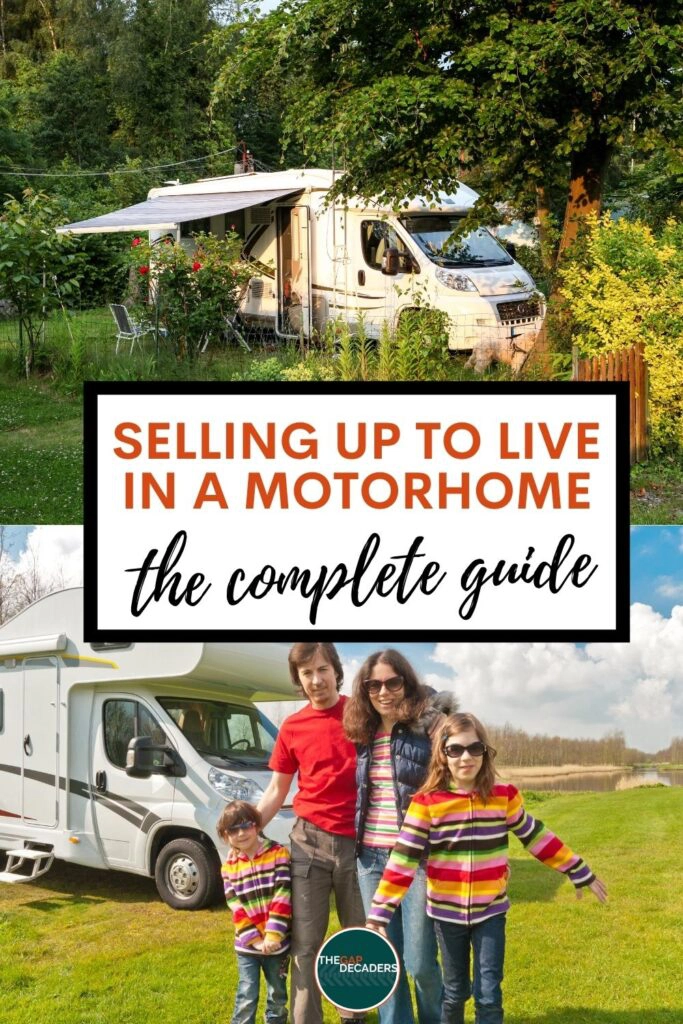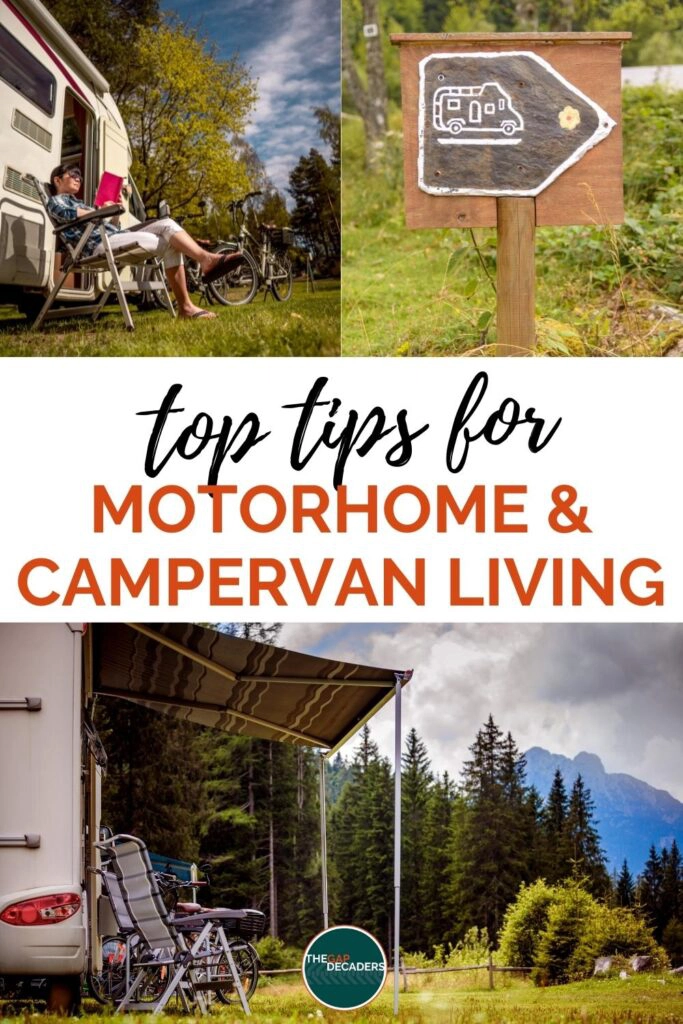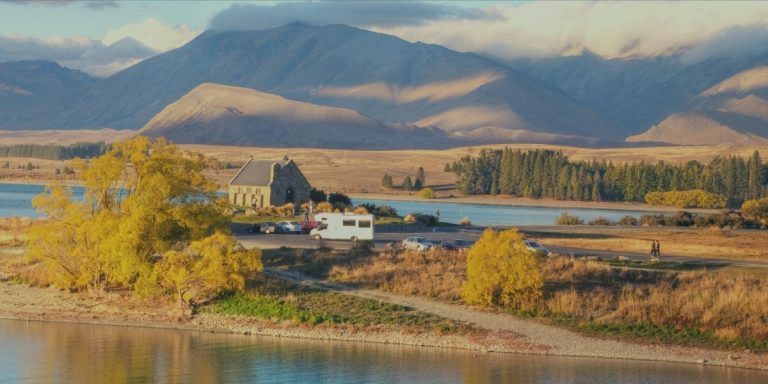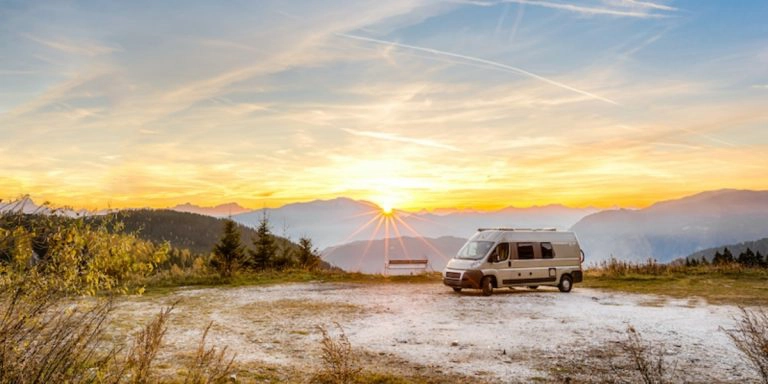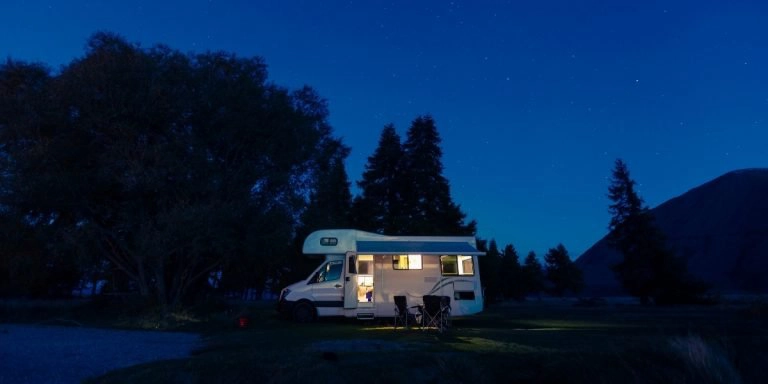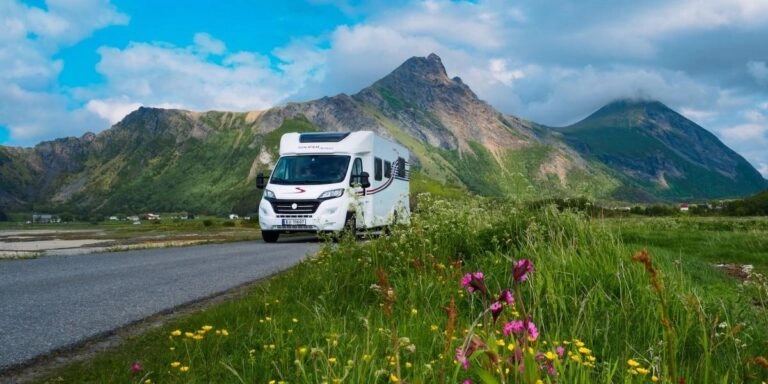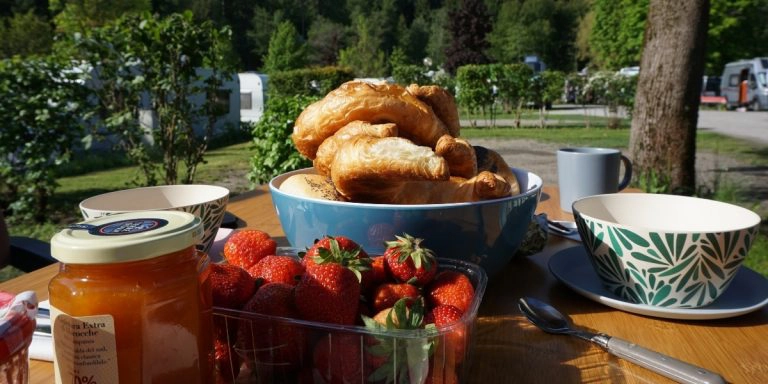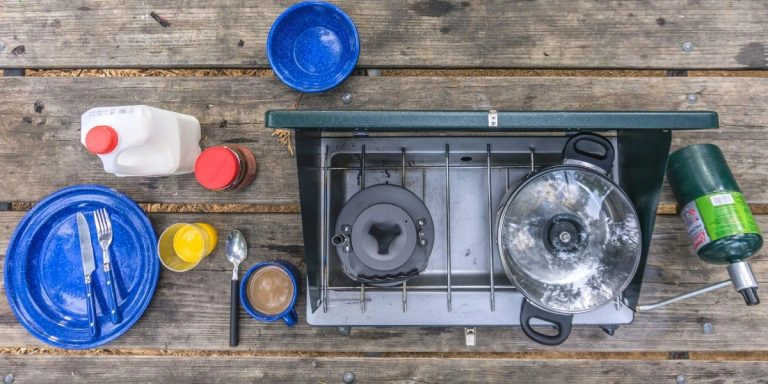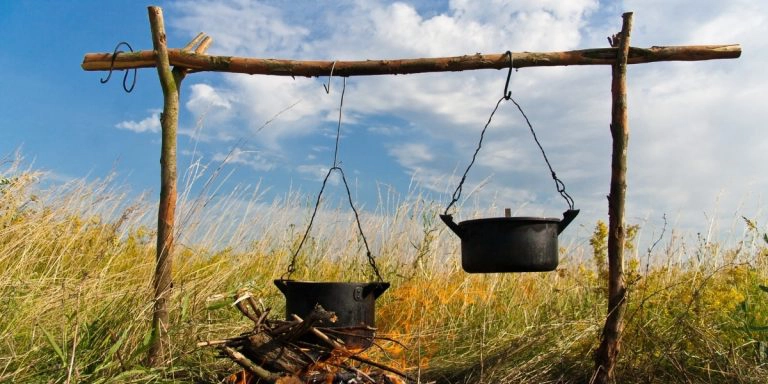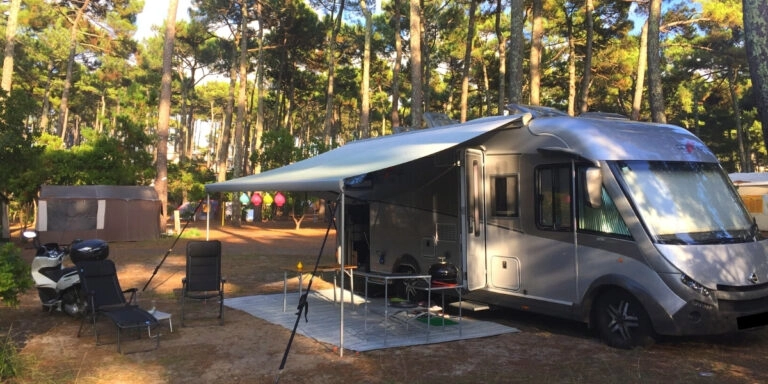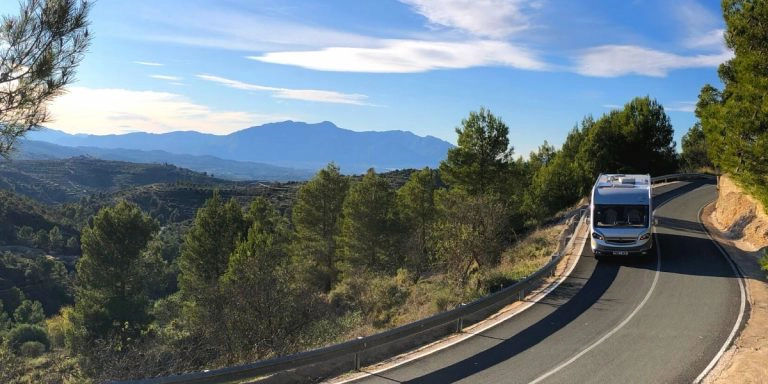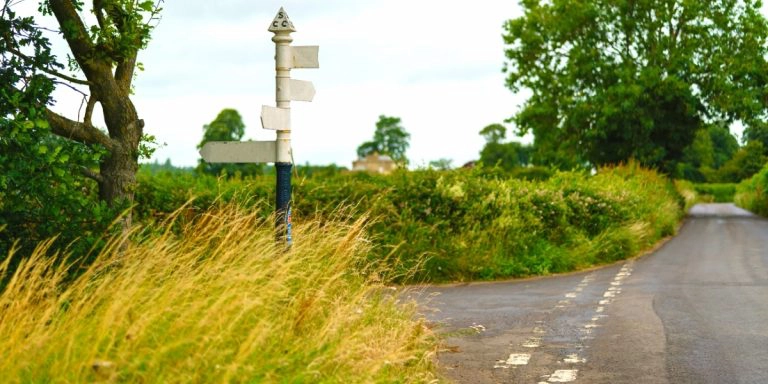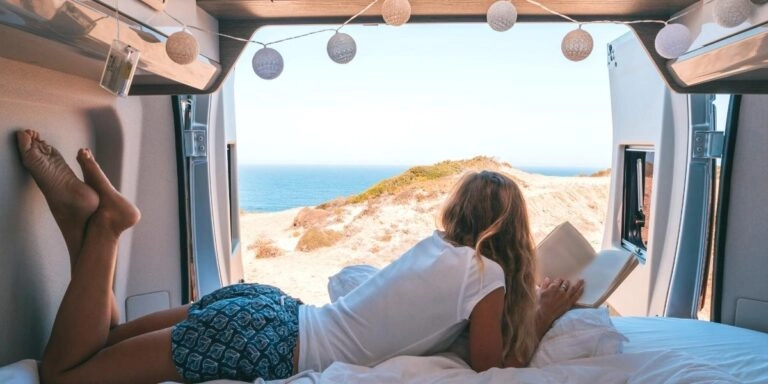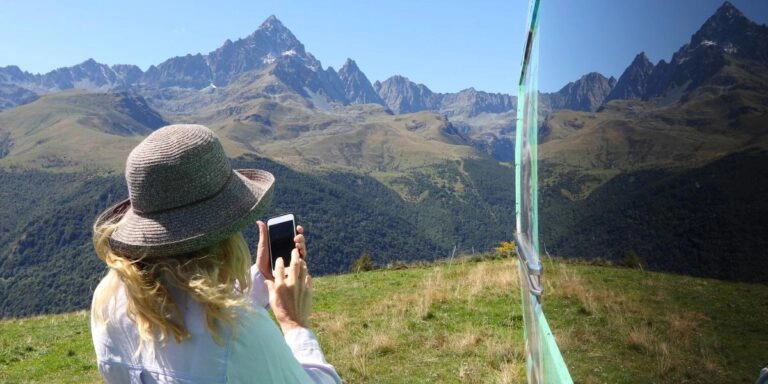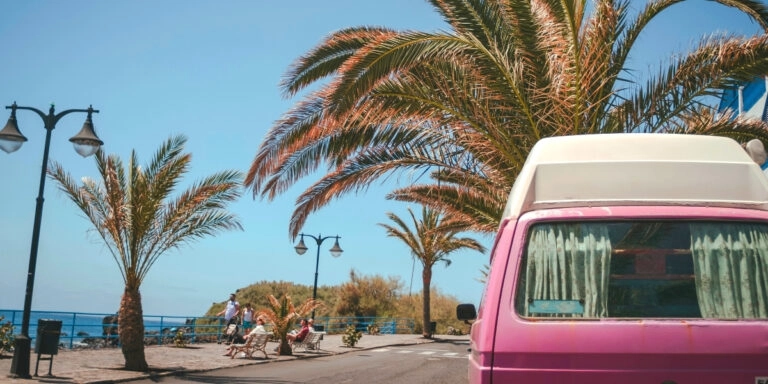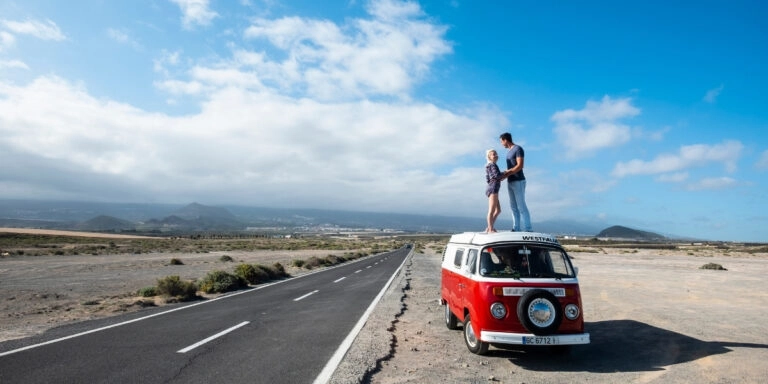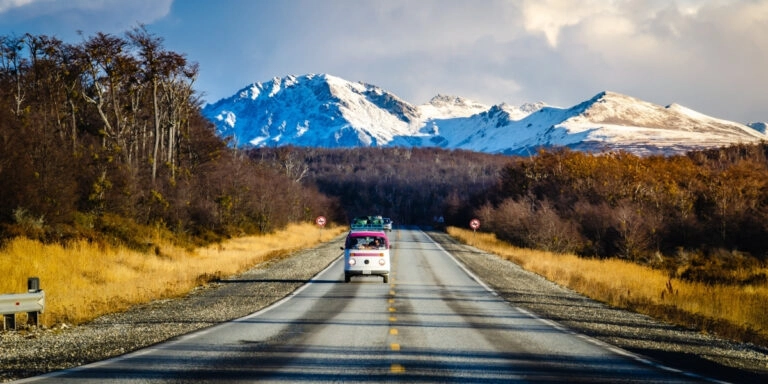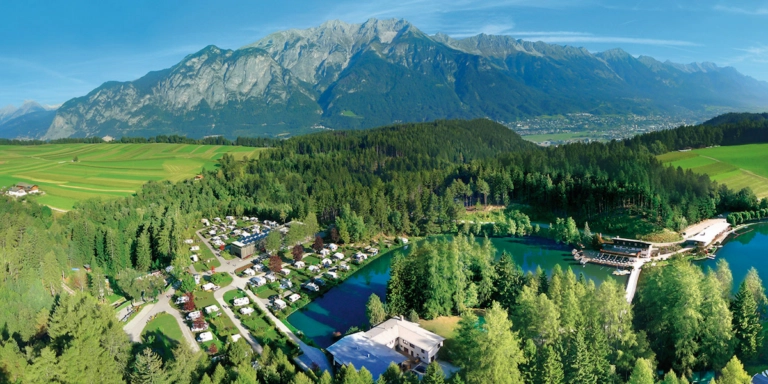This post may contain affiliate links, from which we earn an income.
The Definitive Guide to Motorhome Life
Are you planning to live in a motorhome for a gap year or are you selling up to live the dream full time? It’s a huge, exciting step to take but before you jump in feet first, find out what living in a motorhome permanently is really like and get all our top motorhome life tips.
We are Phil & Izzy, full time motorhomers for the past four and a half years. We sold our house and most of our possessions to live a different sort of life. We’ve travelled across Europe covering 30,000 miles, owned two different motorhomes and now an overland truck, and have learned a bit along the way about how to survive, nay, love, life on the road!
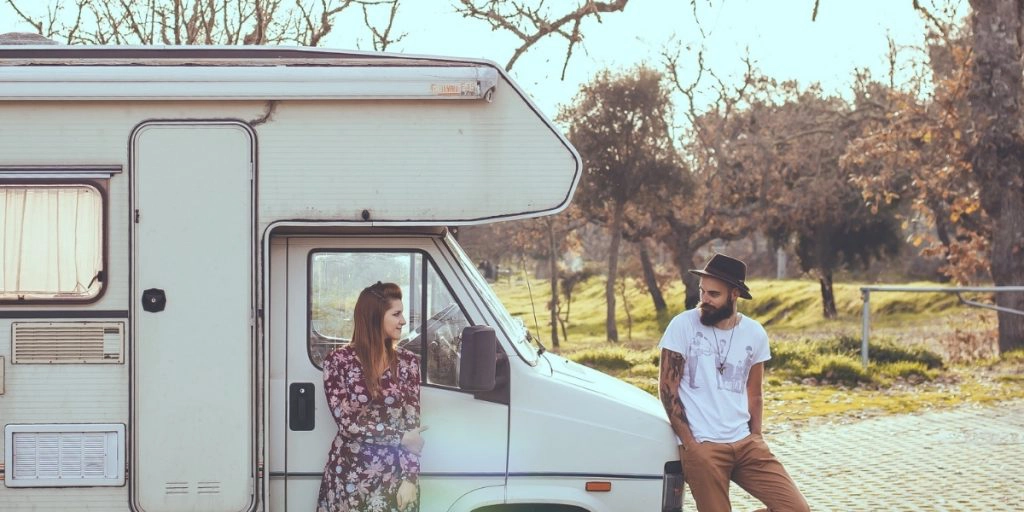
Top Tips for Making the Move to Living in a Motorhome
Successful full time motorhome living is mostly about preparation and that dirty word – compromise! If you are thinking about giving it all up for a life of motorhome travel, ask yourself these seven questions;
1. Does the motorhome or campervan offer what you need?
If you already own a motor home or camper van is it realistically big enough in which to live full time? 24/7 for 365 days of the year? How would you manage if one of you got ill? What about being stuck inside when it gets dark at 4pm or it’s raining for days on end? Can you live in a motorhome in the winter when it’s cold and miserable?
These are such simple things to manage when you live in a house, but living in a motorhome full time is different, you feel the changes in the seasons and elements way more, whether you’re travelling in a motorhome in the United Kingdom, Europe or some far-flung place like New Zealand!
Is your home on wheels fit for purpose? If you’re planning on chasing the sun in Europe, do you want a left hand drive van? Does the bed work for your needs – making one up every night it gets a bit tedious after a while, and those types of beds are really not comfortable in the long term.
RELATED POST – Campervan or Motorhome? Which Is Right For You?
RELATED POST – Motorhome Accessories, Equipment & Options
2. Who are your travelling with?
Can you live in a camper with your other half, in a confined space full time? Or manage alone if you are a solo traveller? What about travelling as a family with kids? How does it work if you’re planning on travelling with a dog?
If you’re used to going your separate ways to work every weekday and enjoying the weekends together, it can be challenging travelling as a couple in a confined space. Make sure you’re not looking at this aspect of van life through rose tinted specs.
RELATED POST – The Ten Truths of Travelling Together
3. Are you willing to compromise?
You may have to give up a lot to achieve your dream of permanent motorhome living. We sold our house and almost all of our possessions and other full timers we know have rented their property. A good question to ask is whether you think you can do without all the trappings of your previous life?
Unless you’re willing to fork out huge sums of money (and OMG it is expensive!) on storing your stuff, then you will probably be looking at selling everything.
For us, the campervan lifestyle and the ability to travel where and when we want is worth far more than any clothes, cars or possessions could be but not everyone feels the same.
RELATED POST – 13 Best Vanlife Books: Inspiring Books For Nomad Travellers
4. Are you chasing the dream or running away?
Do you want to live in a camper van or motorhome for the right reasons? Really dig deep and ask yourself and each other whether you are running away from real life – work, family issues, money problems or whatever else is going on in your world?
Camper van living is unlikely to solve any of those issues and may magnify some of them.
RELATED POST – Our Story… Should You Sell Up to Travel?
5. What’s your goal?
What do you want to achieve from living in a motorhome? You could tour Europe in your motorhome without a plan but will get so much more from your experience if you understand the why.
For us, it was about wanting to do something different with our life and escape the hamster wheel of ‘normal’ …feeling excited, looking forward, rather than waking up with a heavy heart to another day groundhog day.
RELATED POST – How to Take a Gap Year (for Over 50s)
6. How are you paying for it?
How will you finance your motorhome life? It will always cost more than you think, but the cost of living in a motorhome in UK and Europe is still so much cheaper than living in a house.
Living in a motorhome permanently in UK will be more expensive than in Europe due to the cost of campsites and lack of aires and easy wild camping and off grid parking.
You may also have to pay to use services which are generally free or very cheap in Europe. Some of this will be off-set by cheaper motorhome insurance and not needing travel insurance if you don’t intend to travel outside of the UK.
Of course, you also have to take into account the cost of your motorhome, campervan or RV… whichever vehicle you decide is right for you.
RELATED POST – Costs, Money Saving Tips & Hacks for Touring Europe in a Motorhome
7. What about family & friends?
Are you happy to be away from family and friends in the UK? Can you accept that they may not all be delighted for you, a sad reality of following your dreams? The bonus is, as you meet other van lifers, you’ll make a load more new friends who get you and your way of life.
Can you live with paying €1.29 for a good bottle of wine? Oh…wrong post…….
If you’re cool with all that, then this guide will help you understand the finer details of full-timing and how to live in your new home. We’ll share with you how to survive it and how to have the best time of your life doing it!
RELATED POST – Ten Things We Have Learnt in A Year of Motorhome Life
Helpful motorhome guides…
32 Pros & Cons of Owning a Motorhome in UK & Europe
Fifteen Awesome Reasons to Choose Motorhome Life
Staying Safe & Legal in Your Motorhome
Motorhome Tips for Beginners – Essential Know How for Motorhome Life
Top Tips for Living in a Motorhome
What is the best motorhome to live in full time?
I don’t think there really is a single make and model that its better than others – so much depends on your plans and how you want to live in your motorhome. Generally, motorhomes are not designed to be lived in on a permanent basis, so I would say that anything that’s not well made or is a bit flimsy will suffer.
If this is going to be your home for the next however many years, then look to the German or French brands for build quality and longevity. If your budget is tight, older models with a few miles are worth considering. We had a 14 year old Knaus for several years, which was built like a tank and just kept going!
If you’re going for a van conversion, then make sure you fully understand how it’s been built, especially if it’s a self-build. Are you confident in the skills of the builder and the equipment used? The last thing you need is to head off on the road full time in a shoddy build, with problems that will be exacerbated by your lifestyle.
RELATED POST – Buying a Motorhome That’s Right for You – All You Need to Know
Can you live in a motorhome full time in UK & Europe?
People often contact us to ask us questions about the legalities of full-time campervan living. So, is it legal to live in a van?
There is no specific law preventing you from full time motorhome living in UK or Europe, as long as you follow the specific vehicle and residency laws of the country in which you are living or travelling.
In the UK this means you need to be a resident, with a British passport or other entitlement to live there. Your motorhome or campervan must be taxed, insured and have a valid MOT.
You must also follow the correct rules regarding where you park or stay in your motorhome, whether that’s at on permanent motorhome sites, wild camping or parking for free.
RELATED POST – How to Find Free Overnight Motorhome Parking UK & Europe
In Europe, living in a camper van becomes a bit more complex now that Great Britain and Northern Ireland have left the EU. Travelling in Europe has become more complicated because of changes to freedom of movement for United Kingdom citizens in Europe.
It is still possible to travel full time on the continent, but you can now only spend 90 in every 180 days in the Schengen area. This means leaving European countries we are familiar with, and heading for Morocco, some of the Balkan countries, and Turkey.
RELATED POST – Motorhoming in Europe After Brexit
What about insurance?
Motorhome Insurance
The type of insurance you need will depend on where you want to travel and your circumstances. Safeguard, Sterling, Staveley Head and Comfort all over 365 days policies for Europe, which covers all the member states of the EU (a green card is no longer required).
You will need separate cover to visit places like Morocco and Turkey – if you’re lucky your insurance company may cover you, although this is becoming rare now. Otherwise, you need to buy third party insurance at the border.
If you’re selling up to live in a motorhome, scroll down for specific information regarding insurance.
Travel Insurance
You will also need travel insurance to supplement your EHIC/GHIC health insurance card (get one if you don’t have one!) if you are intending on living in a motorhome in Europe or beyond.
Back-packer insurance tends to be the best as it will cover you for up to 24 months, although lots of companies limit you to a year if you’re over 55 years old.
Most companies won’t let you take this out once you’ve started travelling, so plan ahead, although if you use True Traveller (who we recommend) they have a policy where you can renew annually on the road, and they are not interested in where you are ‘resident’ or have spent the last six months. This policy also includes more activities and sports cover as standard than any other we have seen.
What stuff do I need?
Living full time in a campervan will inevitably result in a process of elimination; what do you want and what do you really, really need? Motorhome and campervan storage is always a challenge for long term travellers because of limited space and vehicle weight constraints.
How much you take will of course depend on the size and GVW (gross vehicle weight) of your van and what is important to you. If you are intending to write a cookbook on your travels, then food storage will be a priority.
If, like us, you want an inflatable kayak, two inflatable paddle boards, kite-surfing gear two bicycles and a portable washing machine, its fair to assume that some difficult decisions about everything else might need to be taken.
Clever motorhome storage will give you more bang for your buck, if you can be organised about where things are this will also help; this will evolve as you are on the road. What’s important on day one will have changed by day 60!
We bought all of our storage boxes and packing cubes from Ikea, from hard plastic stacking boxes for the garage and under the bed, to soft felt boxes for the overhead bins; they are innovative and cheap …happy days!
RELATED POST – Storage Ideas for Campervans You Need to Know About!
At the end of our first year of campervan life, we were having the van serviced and there was a weighbridge right next door. Out of curiosity, we ambled over and got weighed …oops! We were half a tonne over our GVW of 4,500kg (and that was with an empty fresh water tank!)
So, we had a massive sort out and were a bit stunned to realised we had been carrying around half a tonne of stuff that we never used! Our rule now is that if it isn’t used in a month, it doesn’t stay.
RELATED POST – An Easy Motorhome Weight Guide
Getting about
You also need to consider how you will get about on a day to day basis. If you mostly free or wild camp, then you will probably be moving on regularly but if you are intending to stay on sites and visit cities (many of which you won’t want to drive into and will need an emissions vignette to do so), you will need some form of transportation other than your motorhome.
This could be a tow-car, a scooter or motorbike, e-bikes or good old-fashioned pedal cycles. Weight, space and cost will be massive factors here but it is an important aspect of living in a motorhome. Being stuck on a site without means to get to the nearest village for a pint of milk is a real bummer!
RELATED POST – The Best Motorhome Bike Racks & Bikes
Selling Up & Living in a Motorhome
If you are renting or selling a house to live in a motorhome, then there a few other things you should be aware of before you take this massive step.
What about an address if I’ve sold my house?
What address will you use if you’re selling up or renting? You will need a UK fixed address for your driving licence and V5 document and this address will also need to be used for motorhome insurance, so think carefully about where this might be, as some parts of the country will increase your premium exponentially due to high risk factors.
Lots of full-timers, us included, use a family members address for DVLA, insurance and banks which helps maintain a credit footprint. You could also be added to the electoral roll at that address – you don’t need to actually live there.
We maintain an address at my Mum’s house – we literally changed our address for everything when we sold the house. We are also on the electoral role, but after the first year of paying the 25% council tax single person discount my Mum received, we told the council we were no longer living there (true) and she now only pays for herself.
You can ‘rent’ an address for most things, but the DVLA will not usually accept virtual, correspondence, PO box or commercial addresses, which makes registering your vehicle difficult.
This is what the DVLA say; “We do recognise that there will be occasions where individuals cannot provide a postal address at which they reside and, in certain circumstances, we do allow an alternative address to be used. However, because of the potential risks, we will only agree such arrangements on a case by case basis and we expect a robust reason and evidence that compels a driver to use such an address”
Vanpost are currently lobbying Government to change this rule and may help you make a case to the DVLA for setting up their service.
Full timing motorhome insurance
If you are renting or selling up to live in a motorhome and don’t have a bricks and mortar base to return to, then you’ll need to take out full timing insurance. This is generally more expensive than regular insurance and you may be tempted to not tell the insurance about your circumstances, but this could invalidate your insurance at some future point.
There is only one try full-time policy available in the UK, which is underwritten by Aviva and sold by the brokers Comfort Insurance and Adrian Flux.
RELATED POST – The Essential Guide to Full-Timing Motorhome Insurance
Access to healthcare
This can be a thorny issue, especially if you’re a more mature motorhomer 😉 Real world problems can take us by surprise – think Covid – and it’s certainly made us think about how to manage healthcare and medical issues.
Booster jabs annually will become a thing, with a fair few countries we want to visit in 2022 asking for evidence of a Covid vaccine within the last seven or nine months, for us to be considered vaccinated. At the moment, there is some evidence emerging of some countries offering jabs and boosters to tourists, but right now it’s challenging.
You might find that once you’ve moved away from your home address your GP surgery takes you off their list. We are registered with the GP surgery which covers my Mum’s address, and we can now have virtual appointments with the GP, but getting routine healthcare like smears and mammograms is not easy.
If you have a long-term condition and require regular medication, your GP may only be willing to prescribe three months at a time, which could leave you without medication in Europe. Lots of countries will sell you the medication from a pharmacy if you take in the box with tour details on and a passport, and in many EU countries you can get antibiotics over the counter without seeing a GP.
Helpful motorhome guides…
All the Best Motorhome Kitchen Accessories
101+ Motorhome Essentials You Need + Packing Checklist
Motorhome & Campervan Cooking Tips, Tricks & Equipment
16 Tips to Help Manage Motorhome Payload
Living Motorhome Life!
So you’re actually doing it! You’re on the road, full time living in a motorhome. For some people it’s an easy transition, less so for others.
We spent the first two weeks of van life euphoric as we headed south to the sun, the third week wondering what the hell we had done and the following six months loving every moment. Most people who live full time motorhome life, tell us they went through a similar process.
After about six months, we took a nose-dive; the weather and clocks changed and with it we became a little desponded and struggled to adapt. We were also a little travel fatigued (yep, it’s a thing) after seeing so many new places and having so many new experiences; we missed being in one place.
But we bounced back and accept that not every day will be perfect, life is life after all …we’re just living it slightly alternatively!
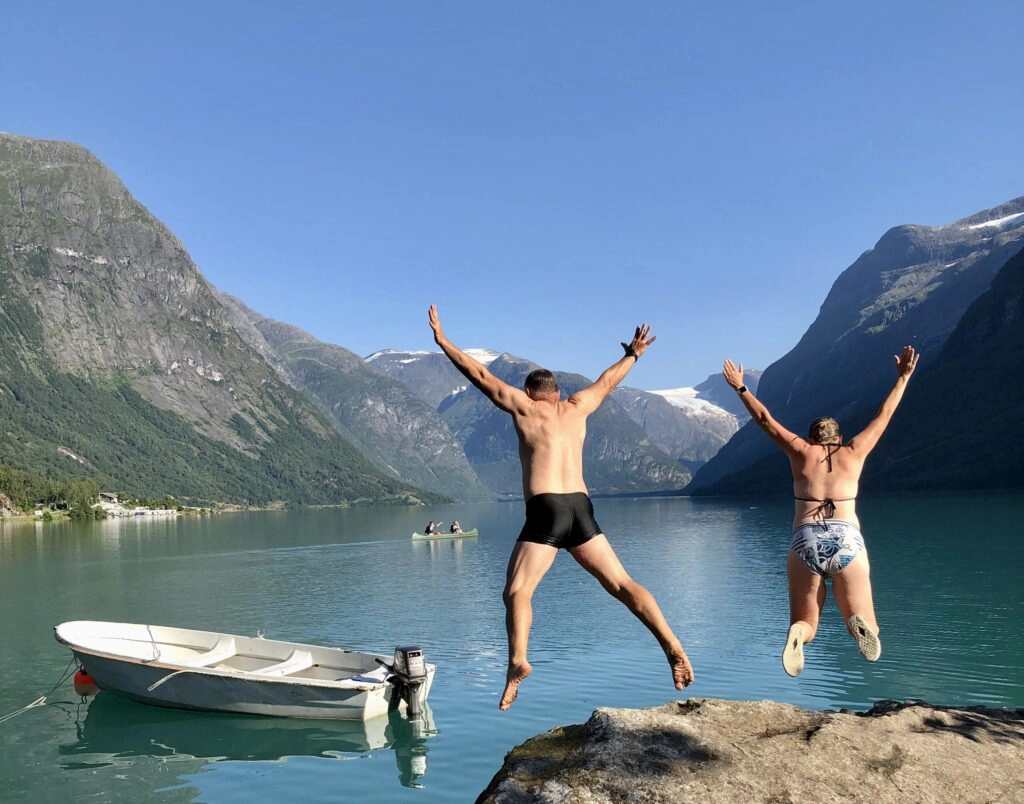
We all need purpose…
We have found purpose by setting up and running our motorhome blog but there are lots of other ways you can fill your time. Try house-sitting or volunteering with WorkAway. If you’re a keen photographer, sell your images through Pexels or Unsplash and earn a bit of dosh.
Perhaps learn a language or take up a new sport; Phil has learnt to kite-surf and we are both (trying) to learn Spanish as we have enjoyed living in our motorhome in Spain so much.
Staying connected
Connectivity is also really important. We thought we would do away with mobiles and become virtuous hippies, but the reality is we use our devices and the internet to research, map, stay in touch and blog.
Email and social media is a lifeline for keeping in touch with friends and family. How did we ever think we would manage without on such an epic (and permanent) road trip?
RELATED POST – An Easy Guide to Motorhome Wifi & Internet
It would be easy to sink into a life of motorhome slobbery (and you may want to, that’s fine) but for us it just wouldn’t work. We spent the first six months revelling in not having to get up for work or clean the motorhome (if we didn’t want to) but eventually our body-clocks kicked in and now we are up at around 8am most days.
We try to eat well and have managed to cook all sorts on our Cadac, including bread, which we would never have had time to make before, just one of the many benefits of living in a motorhome!
We hike a lot and have completed some incredible hikes across Europe, often also wild camping nearby to maximise the experience of the place.
But mostly living in a motorhome is a way to explore, to see, to absorb and to expand our minds. Along with all the ups and downs of this slightly crazy and alternative lifestyle choice, that is and will always be our why.
Other helpful resources…
Are you looking for more tips about motorhome life? Check out these recent posts…
13 Best Vanlife Books: Inspiring Books For Nomad Travellers
An Easy Guide to Motorhome WiFi & Internet (2023 Update)
Motorhome Aires in Spain – All You Need to Know
Campervan Life – Should You Sell Up to Travel?
Storage Ideas for Campervans You Need to Know About!
ACSI Camping Card – 2023 Review & Step-by-Step Guide
Love it? Pin it!
